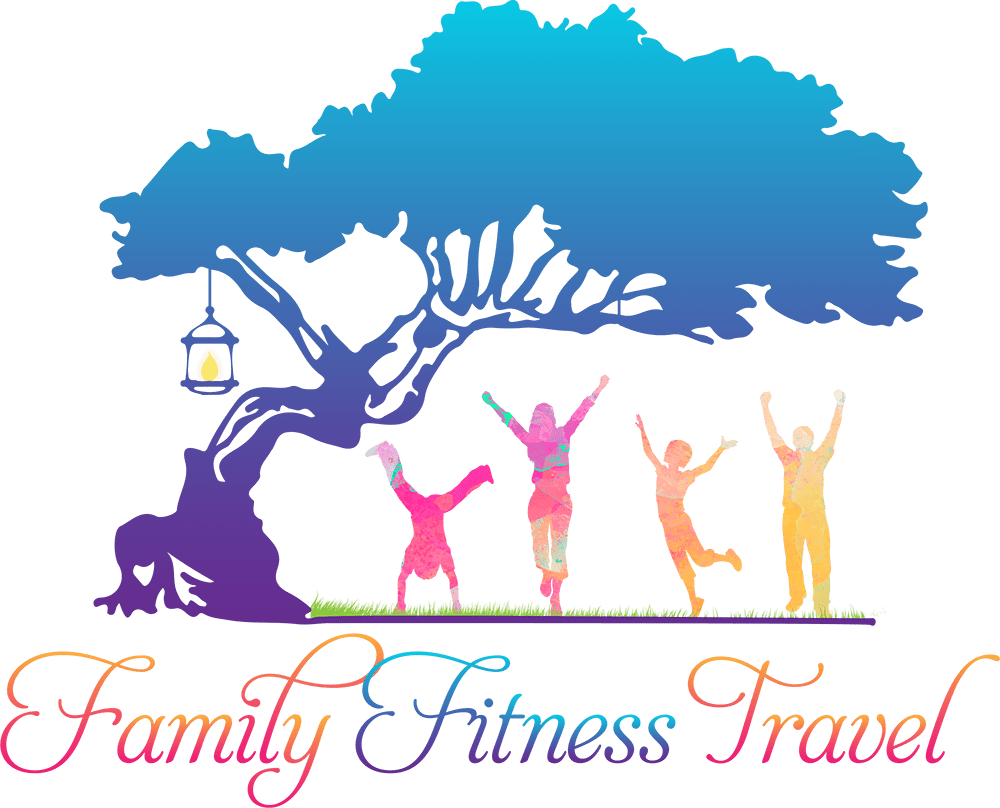Foam rolling to relieve knee pain is easy to learn and can help with many different types of knee pain. If you have pain in your knee during running, post-surgery, different runners knee, ACL replacement rehabilitation, and many others. Find more fitness & stretching tips here.
Like with any foam rolling, start slow, learn what your body an handle and do it consistently. Also, don’t OVER-ROLL. Several runners I have worked with have over-rolled and actually CAUSED more problems for themselves.
Remember that foam rolling is a form of self-care but not a substitute for medical care. If you have pain that won’t go away or you are in doubt, go see an Orthopedic Doctor or a Physical Therapist.
Tips for Relieving Knee Pain with Foam Rolling:
- Basically, roll ALL AROUND THE KNEE JOINT
- Roll above, over, around, under and below the knee
- Use different “lines” of muscles and tissues coming into the knee as guides, and roll along those lines
- Make a few “longer rolls” which incorporate past the area(s) of pain
- Don’t “Over Roll”!
Simple Steps To Relieve Knee Pain With Foam Rolling:
- Start with rolling the calves
- Next, roll the bottom of the Hamstrings where the muscles attach to the knee
- Now, turn over and roll the top of the calves (tibialis anterior) & the tops of your knees
- Roll on the patellar tendon, right in that little space
- Also, roll the quads in 3-4 “lines”, not just the middle of the quads
- End with “long rolls” from above the knee to below it and visa versa
In order for foam rolling to help relieve knee pain, it’s best to cover the entire knee, and all the muscles & tissue that might be involved in any pain.
Keep in mind that where your knee is hurting might not be where the muscles and tissues involved are located. Try to stay open-minded about how your body works and think outside the box. ?
A pain on the inside of your knee might be caused by tight muscles on the outside of your knee, for example.
Disclaimer: Foam rolling the calves, and all the stretches or exercises on this site are for those in good physical condition. Check with your doctor to make sure you are in good enough health for physical exercise and stretches. Do these foam rolling exercises at your own risk.
Affiliate Disclosure: There may be affiliate links on this page. If you click on these links and buy something, FamilyFitnessTravel.com may earn a commission with no extra cost to you.
1. Start With Rolling The Calves
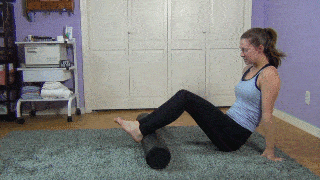
For foam rolling to help knee pain, loosen all muscles & tissue coming towards the knees.
This is a bit more advanced, and if you need help just rolling your calves, we have an article on Foam Rolling The Calves.
- Roll 3 lines of the calves: middle, inside & outside
- Do 7 passes on each calf muscle section or “straight line” leading towards the knee
- On the last 2 passes, move past the knee to incorporate the tissues past the knee (pictured below)
Find out more about our family here.
Leg Over Leg For More Pressure
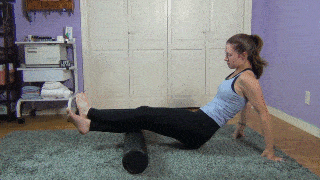
For more advanced rollers, you can put one leg over the other for more pressure and more specific rolling pressure.
- Drape your calves over the roller, lift your hips with your hands and roll from knee to calf by pushing your hips forward
- Go as slowly as you can. This is not easy
- Once you don’t hurt as much, place one leg over the one being rolled for more pressure
- Do 3-7 passes on each line towards your knee
- When VERY tender, use less pressure on the painful area
- Instead, roll the muscle and tissue LEADING TO AND AWAY from the painful spot you found
This takes practice and arm & core strength. If you stick with it, and roll all “strands” coming towards your knee, you will at least bring more blood towards the knee, and hopefully also lessen or eliminate any knee pain.
Related Article: Back Stretches For Beginners
Foam Roll The Calf Up Into The Knee
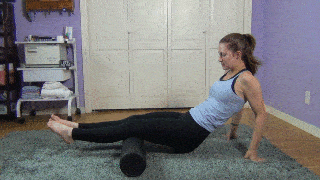
- Roll past the knee
- On the last 2 passes, go past the calves, under the knee
- You could even go a bit further up, into the hamstring (not pictured)
- Do this “long roll” into the knee on every angle (center angle is pictured here)
This is our favorite Travel Roller : Brazyn Life “Morph” Foam Roller
Foam Roll The Inside Of The Calf To Relieve Knee Pain
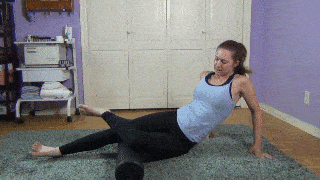
- Roll the inside of the calves, up into the knee
- Start like a side pushup, use your arms to hold you up, then pull your hips towards and away from your arms
- You could even go a bit further up, into the hamstring
- FYI, This can be VERY painful, especially for women, so start soft and slow
Foam Roll The Outside Of The Calf To Relieve Knee Pain
2. Foam Roll Hamstrings To Relieve Knee Pain
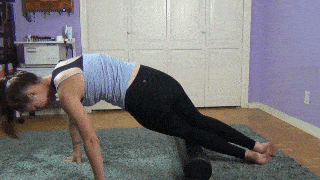
- Roll the outside of the calf, all the way to the ankle, and through to the top of the knee
- Foam rolling this part of your leg can really relieve some knee pain for some runners
- This areas can be painful, so, like with all foam rolling, start slow and soft
- Start in a push-up position, lay on the roller, lift your hips up like a side plank and pull your knees towards and away from your arms
2. Foam Roll Hamstrings To Relieve Knee Pain
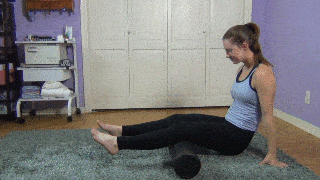
- Next, roll your hamstrings all the way from the bottom of the knees to the gluts
- Foam roll 3-7 times per “line” of muscle & tissue (only the middle line is pictured here)
- Use 2 longer passes to move from hamstring to past the knee
- This can help relieve knee pain, but also back pain and can help in sciatic pain.
Related Article: Back Stretches For Beginners
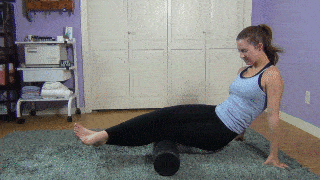
- Next, roll the outside of your hamstrings where the muscles attach to the knee
- Do 3-7 rolls per “line” of muscle & tissue
- Use 2 longer passes to move from hamstring to past the knee
- This area of foam rolling can relieve many different kinds of knee pain
Our top fitness picks: Our Best Fitness Recommendations
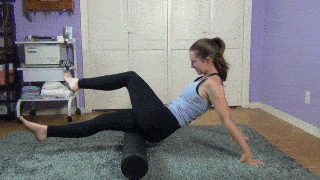
- Next, roll one leg at a time, where the hamstrings come into the knee
- Use your arms to hold you up, and pull your hips towards and away from your arms
- Move your hips from side to side in order to “catch” different muscle and tissue “lines” heading into your knee
- Do 3-7 rolls per “line” of muscle & tissue
- Use 2 longer passes to move from hamstring to past the knee
Related article: Qualities of a Good Workout Partner
3. Turn Over & Roll The Tops Of Your Calves
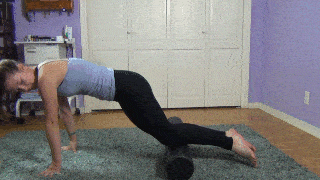
- Turn over and place both legs on the roller by your knee caps
- With your hands holding you up from the front, like a push-up position, roll from knee to ankle
- Lean slightly to one side to get the muscle and avoid your tibia bone
- This works on the tibialis anterior, peroneus longus & peroneus brevis
- Harder Variation: Try to keep your gluts close to your heels the entire time, (which is not pictured in this video)
- Do 3-7 passes on each individual muscle
4. Foam Roll Your Knees Just Below The Knee Cap (Patella)
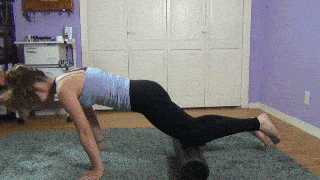
- Foam roll just above and below your knee caps, in that little space
- Turn over and place both legs on the roller by your knee caps
- With your hands holding you up from the front, like a push-up position, roll from the top of the knee cap just past into the calf
- This doesn’t take much rolling space
- Try to roll right on the patellar tendon back and forth, 5-7 times
- Some patellas move around or are not centered, so do your best
- Remember to end with longer rolls
5. Roll Quads In 3-4 Lines
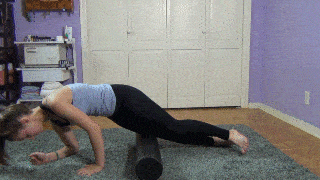
It’s easy to quickly roll over an area that hurts or to completely avoid a spot, this happens often in the quads.
Pictured is Rolling the Outside Quad (vastus lateralis)
- Roll in at least 3 lines: the middle (the easiest), the inside quad and the outside quad
- The outside quad muscle, vastus lateralis, is NOT the IT band, but just inside that big tendon.
- Roll into the knee 3-7 times
- Use the last 2 passes to go past the knee into the calf
- Put the “non-rolled” leg down for support if your leg is tender or if your core strength can’t hold up your legs/body
- Differentiate between the SLIVER of outside quad from IT band
- This can be VERY painful… so start slow and soft
Tip: Concentrate on your outside quad, NOT your IT band. It’s a slight movement from the side of the quad to between the IT band and the middle of the leg
I like this article & video with some ideas about rolling the calves:
The Best Way to Foam Roll the Calves, Stack
Conclusion: Foam Rolling To Relieve Knee Pain
Foam rolling your knees can help relieve pain for many different ailments, including, but not limited to:
Runner’s knee pain
Knee pain, tightness & clicking
Post surgery pain (after the scar has healed!)
General stiffness after sitting all day
Notice that there are “lines” of muscles & connective tissue leading to the knee and roll each one separately, passing over each 3-7 times. Use the last 2 passes to do a longer roll to include the knee in the same line.
This entire rolling routine should take less than 12 minutes for 1 knee.
For chronic pain in your knees, try this 3-4 times per week for several weeks to see if you can change some pain patterns.
If you are in pain for long or have doubts, go see a physical therapist or an orthopedic doctor.
Good luck.
